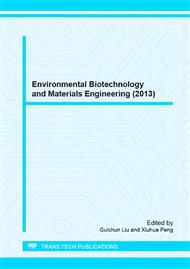p.434
p.440
p.444
p.449
p.453
p.457
p.461
p.467
p.472
Effect of Turning on Moisture Content in Sewage Sludge Composting
Abstract:
Turning can supply oxygen and increase dewatering efficiency during the composting process. This study was conducted to investigate the influence of turning on water removal. In this study, different turning modes were used in different fermentation phases. Results showed that turning in thermophilic phase improve the efficiency of water removal; in cooling phase, higher turning frequency resulted in lower water removal; turning in temperature-increasing phase had no significant effect on water removal. Unturning in the temperature-increasing phase, turning once in the thermophilic phase, and turning every 4 days in the cooling phase achieved the best effects of water removal, the water reduction was 0.566 tonston-1 matrix.
Info:
Periodical:
Pages:
457-460
DOI:
Citation:
Online since:
September 2013
Authors:
Keywords:
Price:
Сopyright:
© 2013 Trans Tech Publications Ltd. All Rights Reserved
Share:
Citation:


